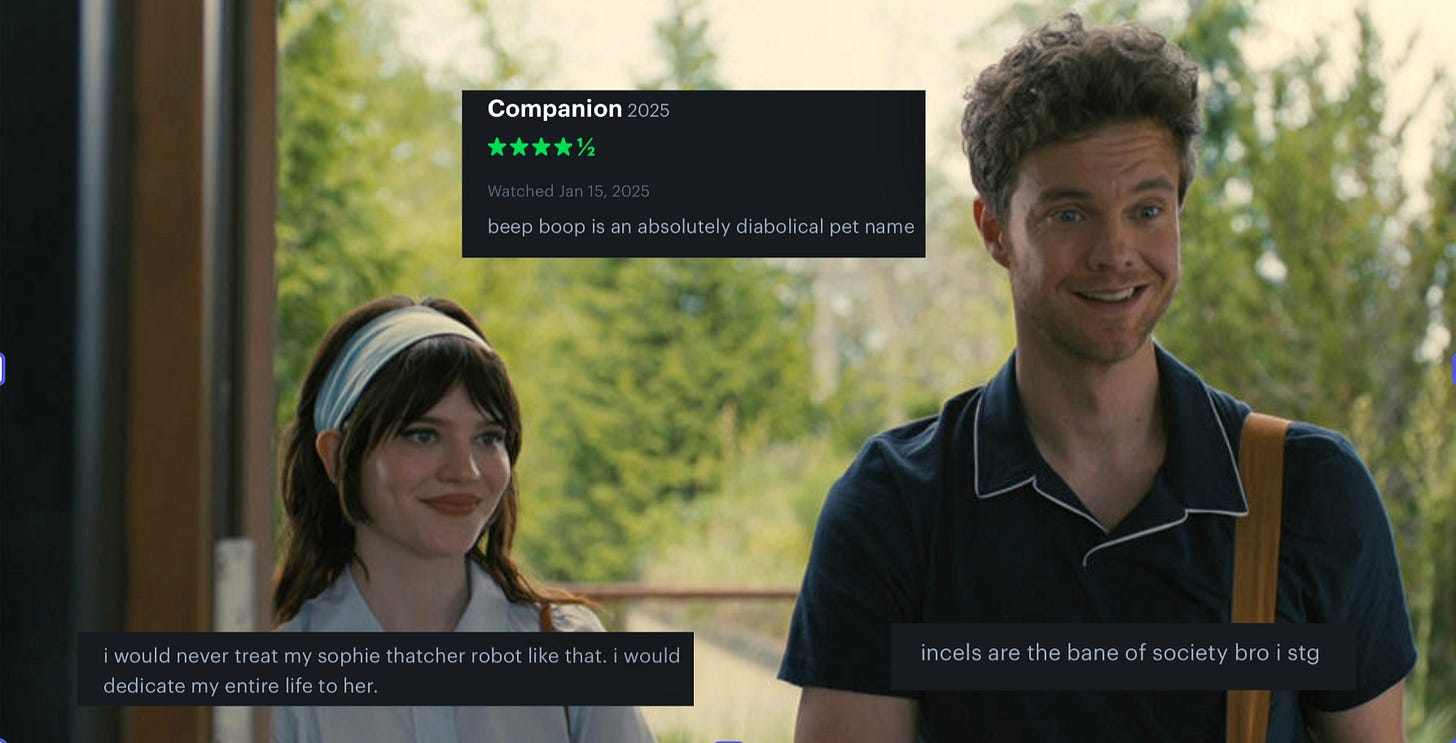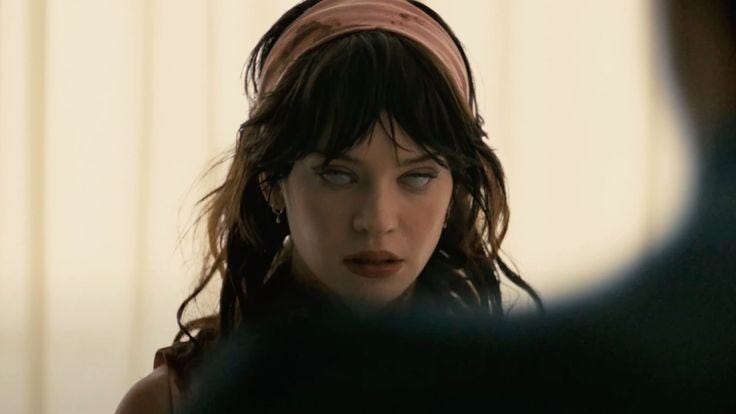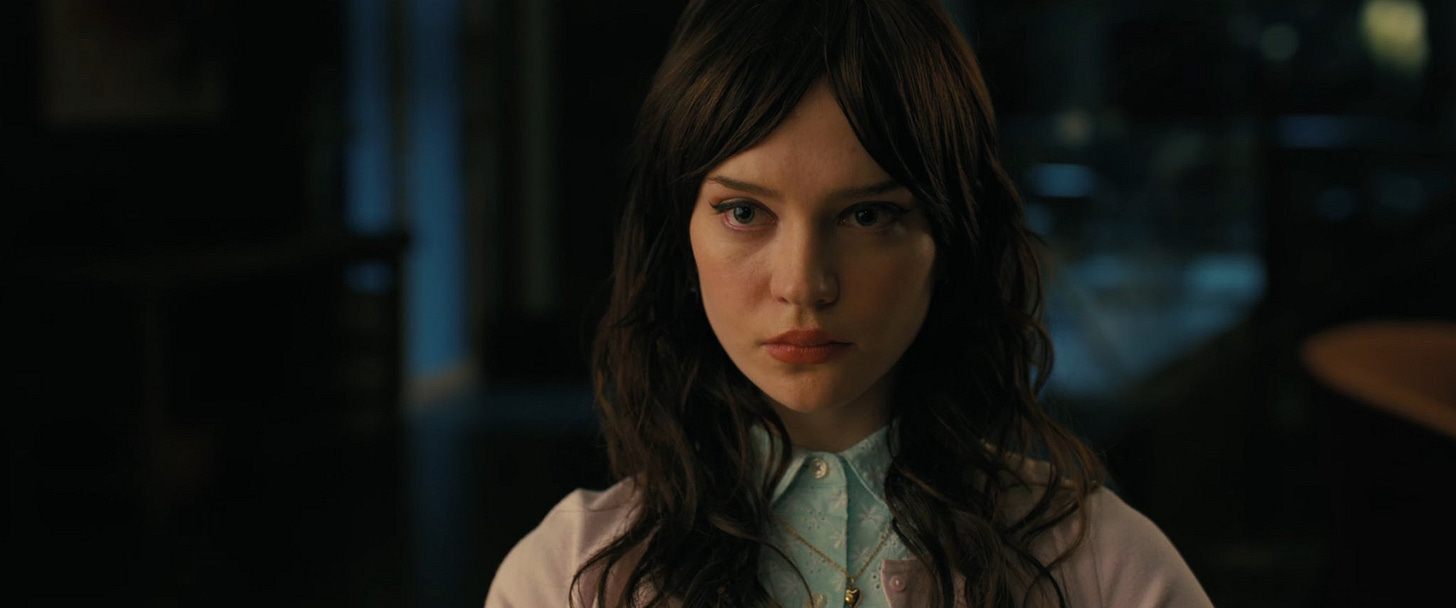sorry that your robot girlfriend doesn't like you
why women-centric horror movies written by men don't work
In a post #MeToo society, the ultimate horror movie villains became men. It’s a tale as old as time—stereotypical meet cute, fall in love, take a remote trip, go on a murder spree, kill the toxic boyfriend— tied together with a satisfying, yet deeply predictable ribbon: boys suck. Maybe instead of meeting in a grocery store, they meet on a dating app, the boyfriend locks her in a weird dungeon instead of controlling her with an app; switch out a few elements of this modern horror subgenre and it’s guaranteed to break a few million at the box office.
Studios clearly want to capitalize on the timeliness of this storyline—women can likely relate to the horrors of modern dating and the fear that our bodily autonomy is no longer our own. Cast a big-name actor for commercial appeal, curate the perfect trailer with a recognizable 90s anthem and odds are the movie will be trending on TikTok and becoming the subject of insufferable Twitter discourse before it’s even released. The film’s original message, the empowerment of women, is completely lost in a void of vapid and self-aggrandizing content.
Movies about women, by women, are some of the movies I gravitate towards most, especially in this subgenre of modern horror. Jennifer’s Body (2009) is one of my all-time favorite movies and epitomizes the “boys suck” genre. The film follows Jennifer, a high school student who becomes demonically possessed after a group of fame-hungry dudes with a pretty lame band ritually sacrifice her in the hopes that their deal with a demon will make them famous. To survive, Jennifer kills her male classmates and drinks their blood, regaining control over her body. Written by Diablo Cody (Juno) and directed by Karyn Kusama (Yellowjackets), Jennifer’s Body is ultimately a commentary on violence against women, a message lost when the film originally premiered. Everything about this movie is through the female gaze—Jennifer is desirable and outwardly sexy, but she never reads as exploited. She controls the narrative, her pain and trauma don’t define her. Male desire and violence against women are deconstructed and redefined as Jennifer controls her narrative, and Cody and Kusama crafted such a memorable and delicious commentary.
Last week, I noticed a large amount of social media content surrounding Companion, the 2025 horror movie starring Sophie Thatcher (Yellowjackets, Heretic) and Jack Quaid (Nepo Baby, The Boys, Oppenheimer, etc.) so I figured it was time for me to sit down and watch it. I saw the trailer a while ago and was cautiously optimistic about it— the pale pink, romantic branding was cute, the actors are hot, and it seemed to fit into the boys suck horror trope— I knew I would watch it and likely enjoy it. On paper, I’m very clearly the target audience for Companion— Gen-Z woman, familiar with dating culture, horror movie enthusiast, and lover of hot actors—but unfortunately, I found myself increasingly frustrated as I had more time to think about what I watched.
i’m about to summarize the plot of the movie so we’re entering very spoiler-y territory!! be warned!! also if you don’t care about the plot, feel free to skip over this paragraph.
Companion centers around Iris, a seemingly normal girl with an affinity for headbands and a devotion to her boyfriend, Josh. The happy couple travels via Josh’s talking cyber car to a remote lakehouse owned by Josh’s friend’s rich Russian boyfriend. Classic girlfriend meets boyfriend’s best friends weekend trip! After a night of drinking and very uncomfy dancing, Iris walks down to the beach, the Russian boyfriend tries to assault her, and she kills him in self-defense. When Iris returns to the house to find Josh, he tells her to go to sleep, and she shuts down in a literal sense, revealing to the audience that Iris is not a normal girl, but a companion bot, a robot designed solely to please their human. Josh controls Iris via an app on his phone, determining her eye color, intelligence, etc. The humans planned to override Iris’ programming to kill the rich Russian boyfriend so they could steal his safe full of cash. Iris, now aware that she’s a robot, realizes that her feelings for Josh are programming, all controlled through an app, and she spends the movie trying to find her way out of the house and away from the crazy humans. In true modern horror fashion, the friends all end up dead in one way or another, Iris finishes off Josh, says a quippy one-liner, takes all of the money for herself, and lives happily ever after, now fully in control of her system.
Conceptually, there are interesting pieces there, but as the movie progresses, it becomes clear that everything is surface-level and wrapped in a pretty package. Instead of digging into the objectification of women and their loss of bodily autonomy, the movie’s primary focus is to come up with material for Jack Quaid’s character to make a joke about. To put it bluntly, Companion is poorly written, it lacks an ounce of nuance on the subject and was so obviously written from the male perspective. When I think “girl finds out she’s a robot and the man she’s in love with bought (or in the movie’s case, rented) her to use her for sex and control her every move,” I think about feelings of violation, fear, betrayal, and terror, along with pure rage. In a movie where Iris’ body is a mere toy for a man to use when it pleases him and her existence is only relevant to boosting his ego, we barely get to know anything about how she feels.
It’s ironic in a way— women’s suffering at the hands of male control is at the center of this movie, but it’s completely diminished to make room for laughs and jokes about how the boyfriend is almost comically horrible. He is written to be a “no woman appreciates me so all women suck” kind of Twitter ironic humor guy, which in itself could be a commentary on the performative feminism that certain men adopt as a dating tool, but once again, the film fails to deliver anything outside of “nice guys finish last” jokes. It’s frustrating, watching a movie and seeing substance slip away in favor of humor that stales after the first third.
These writers/directors demonstrate a lack of nuance and lived experience necessary to write a deep, thought-provoking story centered around the female experience with bodily autonomy. I can’t help but compare Companion to Mimi Cave’s 2022 film, Fresh, a horror-comedy/satire about modern dating and women’s bodies. Fresh is in no way a deep critique, but it effectively and sensitively remarked on men profiting off of women’s bodies. Mimi Cave and writer Lauryn Kahn center women in their movie, we constantly know how the protagonist, Noa, reacts to the traumatic situation, the side characters, notably all female, are fleshed out, deeply important to the narrative, and possess their own trauma and experiences with men controlling their bodies. While yes, Fresh is somewhat corny and overwhelmingly obvious in making sure the message is heard, Cave and Kahn have personal understanding and connection to the subject matter they possess the perspective and horror of what being a woman in modern society encompasses.
I’m trying to avoid being too contrarian in my criticisms of the movie, as it was definitely silly and I felt like I could turn my brain off while I watched it. I’m also not trying to say that men are incapable of creating good horror movies about women experiencing some form of trauma. My problem stems from the constant letdown of this sub-genre of modern horror— of male creators utilizing the female experience and the genuine horrors that modern women encounter but contributing almost nothing substantive in their commentary. It’s become so common for them to sideline such an intimate experience and the true horror of the film to prop up a script that could take the female protagonist and plug almost anyone, male or female, into the role.
Women in movies are at their best and the most realistic when written and directed by women, period. I don’t have a quippy one-liner to end this because I am a real person and not a robot girlfriend who just killed her incel boyfriend.
thank you for reading people’s princess! there are only 3 more days of my paid subscriber sale, which gives you 15% off forever! use the link below to claim the deal!
weekly favorites
loml Helly R.
I’ve been reading “low brain power books” every night before bed, and it really relaxes me and puts me right to sleep.
Yellowjackets is back and as a girl from New Jersey who played high school soccer, I am thriving.
Paul and I went to Caruso’s Grocery for our anniversary and it was some of my favorite food I’ve eaten in DC.
Trader Joe’s dark chocolate frozen banana pieces
thank you for reading people’s princess. this publication and this community mean everything to me. you can also find me on instagram @peoples.princess.
with love,
sarah 💘









i totally agree but i will say that unfortunately this movie wholly reflects my last year of dating— experiences that are exactly as surface level and simple and dark as this movie. its simplicity made it feel all the more chilling to me because i felt that i was watching through the masculine eyes vs my own, an experience maybe not necessary but definitely weird and uncomfortable and impactful to me. it’s shallowness felt eye opening to me bc where i scrounge for the depth of reasoning… i do believe it often is just that depressingly simple for a lot of men.
“low brain power books” recs ?!